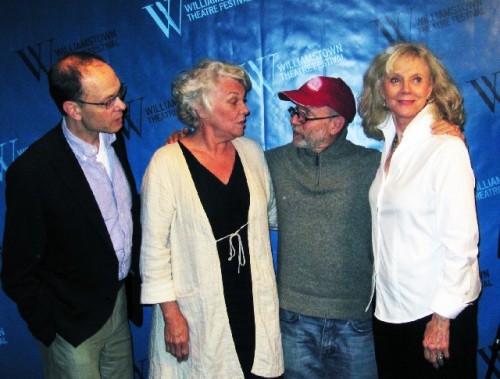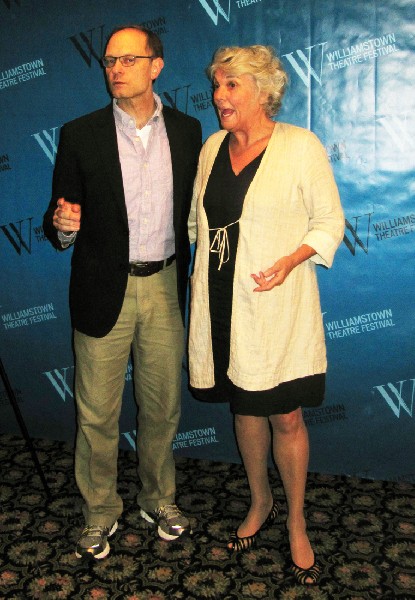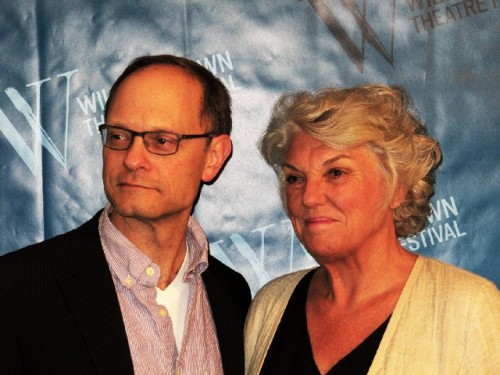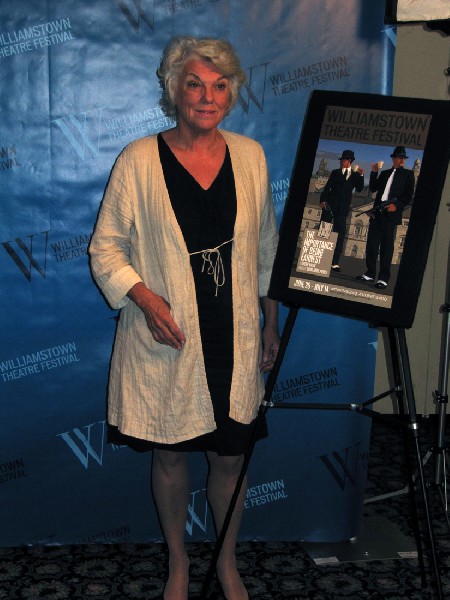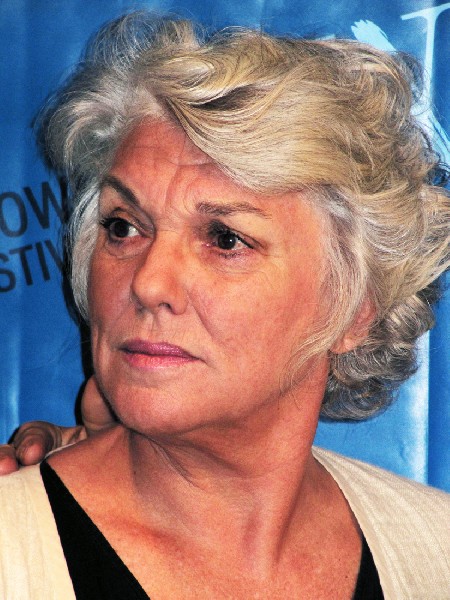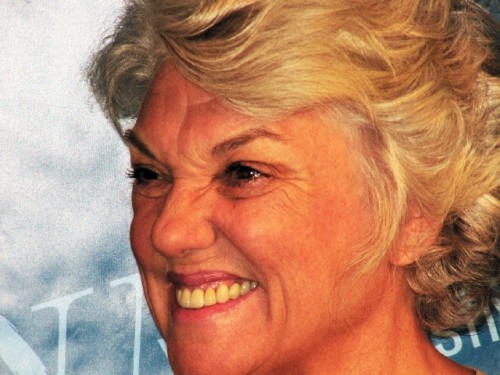A Tyne Daly Speed Date
Going Wilde at Williamstown Theatre Festival
By: Charles Giuliano - Jun 26, 2012
This week, Thursday, June 28 is opening night of Oscar Wilde’s The Importance of Being Earnest, directed by David Hyde Pierce at the Williamstown Theatre Festival.
As a part of a recent press conference and photo op at the Williams Inn members of the media were given face time with directors and stars of the opening productions the other being The Deep Blue with Blythe Danner.
As a married man I’m a bit out of touch with speed dating. You were just getting into a dialogue when a PR person interrupted and moved you on for the next brief encounter.
The challenge is that, jumping from one interview to the next, you have to connect fast. And hope you aren’t boring by asking the usual questions. Or get off on the wrong footing as proved to be the case.
Launching into the empty seat next to Tyne Daly, who appears in Earnest, it was full tilt boogie.
Charles Giuliano Hello. I’m your next date.
Tyne Daly It’s very strange because when there’s a gap you feel like the loser date.
CG You do so many things going back to TV and Starsky and Hutch.
TD Starsky and Hutch! Not you too. (Laughing good naturedly) Cagney and Lacey, please. (October 8, 1981 to May 16, 1988.) (Laughing) Although we were compared and I knew David Soul very well.
CG Oops. My bad. That shows my age.
TD I guess they were about the same time. (1975-1979)
CG You went on to develop so many other personas. You are well known for your musicals and cabaret work. There seems to be an enormous versatility coming here to play a comedy. What works best for you? In baseball they talk about a fast ball over the middle of the plate. Something you can hit out of the park. In that sense what works best to you?
TD Hmm. I just got inducted into the Theatre Hall of Fame. I was in London at the time playing in Master Class, again. I played it in New York and I played it again. So I couldn’t go. The Hall of Fame is awesome but you don’t see any 66-year-old baseball players who are still playing (laughs). I think I wanted to be a long distance runner to continue with sports analogies. I always thought I wanted to be in it for the long haul. I went into the family business. So I knew the difference between being the new girl, the it girl, for a minute. My father was James Daly who had a wonderful career in New York. He did television work. A lot of early TV. A lot of live television. Then, at the end of his career he did a series called The Medical Center. At the very end he went back to the stage and renewed his enthusiasm. He died very young. He was gone at 59. My mother was an actress. My brother is an actor. My brother in law is an actor.
CG So you grew up on the road with a suitcase.
TD Pretty much. We went to summer stock every summer.
CG So Mama Rose was perfect for you.
TD I did not have a stage parent. They didn’t let me work as early as I wanted to work. They made me wait.
CG Did you identify with Mama Rose? Was she a good role for you?
TD Umm. Yeah (with emphasis). Gypsy is in the top five musicals. It’s beautifully built. There’s not an ounce of fat on it. It’s just built. I had the opportunity of working with its author, who was also my director. Working with Arthur Laurents (July 14, 1917 – May 5, 2011) was an amazing experience.
(In April 1989, she starred as Rose in a 14 city U.S. tour of Gypsy which reached Broadway in late 1989. This production was the second revival of the show to play Broadway, the first was in 1974 with Angela Lansbury. Daly won the 1990 Tony Award for Best Actress in a Musical. Daly left Gypsy in July 1990, with Linda Lavin playing Rose, and returned in April 1991 through closing in July 1991.)
It was Arthur, Jule Stein who was still with us, and Stephen Sondheim. I was coming off six years of television. I had been on stage in between. But nothing memorable. A couple of good plays actually. I said “Fellahs, lock me in a room and tell me everything you know. And I will try to take it to the people.”
And I had the advantage of the women who had played that role. All the women who played that role. At that time I did not have a musical persona. It was my first musical in ten years. I went to the American Music and Dramatic Academy. The premise of that school was that an American actor had to deport themselves on the musical stage. It was before the English invasion. It was our form. It belonged to us. Phillip Burden, who was an Englishman, ran the American Music and Dramatic Academy. Sort of along the line of LAMDA (The London Academy of Music and Dramatic Arts). We worked with Sandy Meisner on method. We studied Shakespeare. We did fencing. I was pretty good. But we also had to sing.
CG I sense a toughness from you.
TD Strength. Tough I don’t like. Strength.
CG You seem very frank and up front about yourself like revealing your age. You convey a sense that I am who I am.
TD It’s one of the services I do for women in this country. (laughs) I got lucky enough to find a window of opportunity, through television, where we were speaking to the female audience in a way that they were not used to being spoken to. I had spent at least fifteen years. I was never pretty enough to be the decoration on the hero’s arm. But I suffered a lot. I suffered a lot. I got to do a lot of suffering and being victimized. A lot of having brothers who were physically compromised. Lovers who had hung themselves. Women who were being threatened in various ways. Being raped. Murdered. Having diseases. After a while I got really tired of making those faces. But then I lucked into getting to play the hero. When I got to play the hero it proved to be quite meaningful to the audience that was out there. That had not been tapped. It was certainly more fun than playing the decoration. (laughs)
CG More depth.
TD Yeah. More stories. Those stories most weeks, all weeks, were about the two heroes of the play. The men in our company were wonderful and lovely but highly uncomfortable, in 1982, and 83, and 84 and 85 and 86 because they weren’t used to being on the margins.
CG You made the bust.
TD Yeah. And we didn’t get rescued. Our foremothers were Charlie’s Angels and Policewoman. In both of those cases the women were either answering to a higher male authority or being rescued by the boys. The boys would come in at the end and do the run and gun. In Cagney and Lacey if there was any run and gun it was up to us. So, although I don’t think you can play a role model, people come up to me and say “What’s it like to play a role model?” You can’t play a role model. You have to play a person.
CG Be yourself.
TD Yes. To be specific. To be a specific person. The more specific she is the more universal she becomes. I’ve been very lucky. I’ve gotten to play some great women. My role in Judging Amy was another.
(September 19, 1999, through May 3, 2005, on CBS-TV. It starred Amy Brenneman and Tyne Daly. Its main character (Brenneman) is a judge who serves in a family court, and in addition to the family-related cases that she adjudicates, many episodes of the show focus on her own experiences as a divorced mother, and on the experiences of her mother (Daly), a social worker who works in the field of child welfare. This series was based on the life experiences of Brenneman's mother.)
There was a whole new set of responsibilities because I was playing ten years older than I am. I thought she was going to be retired at the beginning and it would be this easy gig. We quickly realized, the powers that be, which was Amy Brenneman, that watching Amy think on the bench was fine, but it wasn’t very active. So they put the old lady back to work. (laughs) They put her back on the street.
CG Great to see you still working. We’ll look forward to seeing you play a Lady in Importance of Being Earnest.

